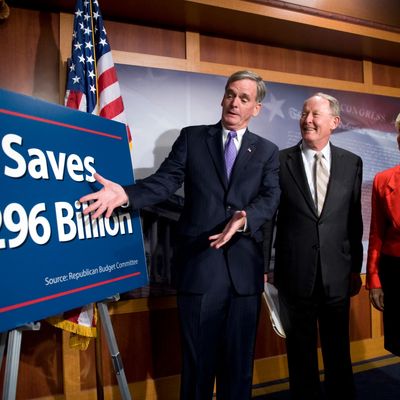
One of the unnoticed ways in which American politics has changed under Donald Trump is the quiet disappearance of the budget deficit as a fixation of the news media and the business and political elite. During Barack Obama’s two terms in office, terror about deficits positively consumed the discourse. A terror of doubt inspired an endless stream of presidential debate questions (none of which bothered with climate change), bipartisan commissions, supercommissions, panels, and op-eds. The concern transcended partisanship — indeed, it usually manifested itself as a concern about partisanship, expressed as the hope that the two parties could work together, the purpose of which was assumed axiomatically to be the prevention of fiscal calamity.
No figure in Congress, save former deficit saint Paul Ryan, played as important a role in fomenting deficit hysteria in the Obama era as Judd Gregg. The Republican New Hampshire senator was an especially credible messenger because he briefly accepted a position in the Obama Cabinet before withdrawing under partisan pressure, and he co-sponsored the bipartisan bill to create what became the hallowed Bowles-Simpson commission. Gregg’s warnings of civilizational peril were thus taken with the utmost seriousness.
“The practical implications of [Obama’s budget] is bankruptcy for the United States,” he warned in 2009. “People will not buy our debt, our dollar will become devalued. It is a very severe situation.” No less than the dissolution of American government lay ahead: “You’re running a banana republic is what it comes down to. You can’t afford to pay those debts.” And even as the deficit fell, Gregg’s terror of banana republicdom did not. “At some point — and if the CBO numbers are anywhere near right, it will be in the not too distant future — we as a nation will have a fiscal crisis of potentially apocalyptic proportions,” he predicted last year.
The coming fiscal apocalypse no longer grips the minds of the business community or spokesmen like Gregg. Abelson’s reporting finds that Gregg’s about-face is fairly typical of the financial industry. Wall Street was ground zero for deficit panic in the Obama era, and its response to Trump has been largely positive in general, bordering on giddy at his economic proposals. Max Abelson reports that Lloyd Blankfein, Jamie Dimon, and Brian Moynihan are all veterans of “Fix the Debt,” a powerful voice for austerity in the Obama years, and have all endorsed Republican tax-cut plans.
Developments since the Obama administration departed have clarified some of the controversies during it. The debt scolds’ professed panic at looming fiscal insolvency turns out to be, in large measure, cover for a panic at a government that would redistribute too much income from people like themselves.
Indeed, Gregg himself, according to Abelson, “says it wouldn’t be so terrible if slashing taxes added $1 trillion or $2 trillion to the $20 trillion the U.S. already owes.” What’s another trillion or two between friends? Especially when — as the CEO of a Wall Street lobbying group — you are one of the friends poised to enjoy its lucre?






























